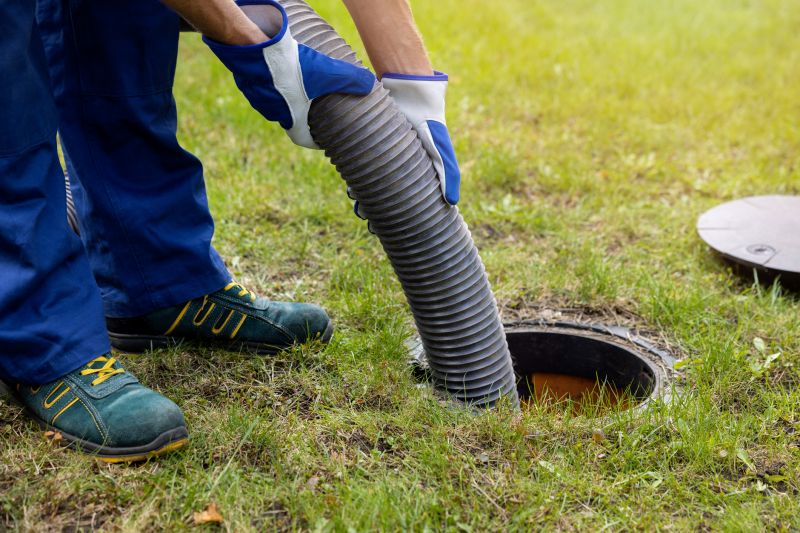Top-Rated Products For Effective Drainage System Maintenance
Browse a curated list of trusted tools and equipment to keep drainage systems functioning optimally.
 Effective drainage systems are essential for maintaining the integrity and safety of residential, commercial, and industrial properties in Richmond, KY. Proper drainage helps prevent water accumulation that can lead to foundation issues, erosion, and indoor flooding. There are numerous products designed to facilitate efficient water flow and manage excess moisture around properties. From simple solutions like drain covers and grates to complex trench drainage systems, the variety of products available ensures that property owners can find options tailored to their specific needs.
Effective drainage systems are essential for maintaining the integrity and safety of residential, commercial, and industrial properties in Richmond, KY. Proper drainage helps prevent water accumulation that can lead to foundation issues, erosion, and indoor flooding. There are numerous products designed to facilitate efficient water flow and manage excess moisture around properties. From simple solutions like drain covers and grates to complex trench drainage systems, the variety of products available ensures that property owners can find options tailored to their specific needs.
Top Overall Option
Modular Trench Drain System
A modular trench drain system offers flexible installation options and customizable configurations to suit various property layouts. Designed for durability and ease of maintenance, these systems effectively channel surface water away from critical areas, reducing the risk of pooling and erosion. They are suitable for driveways, patios, and commercial landscapes, providing a reliable drainage solution adaptable to different site requirements.
Types of Products For Drainage Service
Drain Covers and Grates
Protect drainage openings and prevent debris from clogging systems with durable covers and grates suitable for various applications.
Flexible Drain Hoses
Ideal for redirecting water from specific areas, flexible hoses are easy to install and adapt to different terrains.
Perforated Drain Pipes
Used in French drain systems, perforated pipes facilitate groundwater flow and prevent water accumulation.
Catch Basins
Designed to collect surface runoff and debris, catch basins help prevent clogging in drainage systems.
Trench Drain Systems
Long, modular channels that efficiently direct water away from driveways, walkways, and commercial sites.
Subsurface Drainage Pipes
Installed underground to manage groundwater and prevent soil saturation around foundations.
Water Pumps
Used to remove accumulated water from basements, crawl spaces, or low-lying areas.
Sump Pumps
Essential for basement waterproofing, sump pumps actively remove water from sump pits.
Drainage Mats and Panels
Provide additional support and separation in drainage systems, especially in landscaped areas.
Erosion Control Blankets
Help stabilize soil and prevent erosion in areas with heavy water flow.
Channel Drain Kits
Complete kits for installing surface drainage channels quickly and efficiently.
Rainwater Harvesting Systems
Capture and store rainwater for reuse, reducing runoff and managing water flow.
Pipe Connectors and Fittings
Ensure secure and leak-proof connections between drainage components.
Drainage Inspection Cameras
Assist in diagnosing clogs and blockages within underground drainage pipes.
Gravel and Aggregate
Used as a bedding or filtration layer in drainage systems to improve water flow.
Waterproof Membranes
Protect structures from water infiltration in drainage and foundation systems.
Soil Stabilizers
Improve soil integrity and reduce erosion in drainage areas.
Popular Choices
Widely used for their simplicity and effectiveness in preventing debris entry.
Popular for their adaptability in redirecting water around obstacles.
Common in French drain setups for effective groundwater management.
Frequently installed in parking lots and driveways to prevent surface water pooling.
Chosen for their modular design and ability to handle large volumes of surface water.
Essential in managing soil moisture levels around foundations.
Often used in basements or low-lying areas prone to flooding.
Commonly installed in residential basements for water removal.
Popular for quick installation in residential and commercial settings.
Increasingly used to manage stormwater and reduce runoff.
Valuable for diagnosing underground drainage issues.
Frequently used as bedding material in drainage projects.
Drainage products come in various forms, including flexible hoses, heavy-duty pipes, catch basins, and specialized pumps. Each type serves a different purpose, whether redirecting surface runoff, draining groundwater, or preventing clogging in critical areas. Proper installation and selection of the right products are crucial for optimal performance, especially in areas prone to heavy rainfall or poor soil drainage. When considering drainage solutions, it is important to evaluate the property's layout, soil type, and water flow patterns.
Investing in quality drainage products can help mitigate water-related issues and protect property investments. Regular maintenance and inspection of drainage systems are recommended to ensure they function correctly over time. Local conditions in Richmond, KY, such as seasonal weather variations, should also influence the choice of drainage products to ensure long-term effectiveness and durability.
Key Buying Considerations
- Assess the specific drainage needs based on property layout and water flow patterns.
- Consider the material durability and resistance to local weather conditions.
- Determine the appropriate size and capacity for the intended application.
- Evaluate ease of installation and maintenance requirements.
- Check compatibility with existing drainage infrastructure.
- Identify whether the product is suitable for surface or subsurface drainage.
- Consider the potential for clogging and the ease of cleaning or clearing blockages.
- Review product certifications and quality standards for safety and reliability.
- Factor in local regulations and codes related to drainage system installation.
- Estimate the long-term costs, including maintenance and potential repairs.
- Look for products with available accessories and fittings for expanded functionality.
- Ensure that the product materials are suitable for the types of debris or sediment encountered.
- Evaluate the flexibility of modular systems for future modifications.
- Consider the environmental conditions such as soil type, rainfall intensity, and slope.
- Check for warranties or guarantees offered by the manufacturer.
